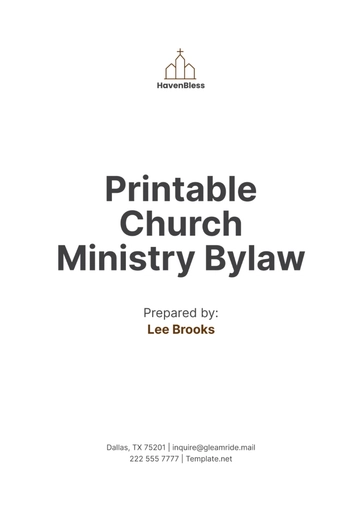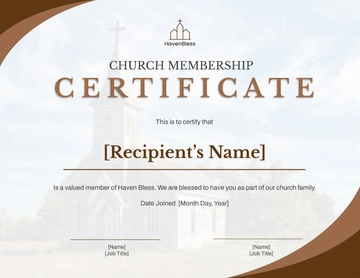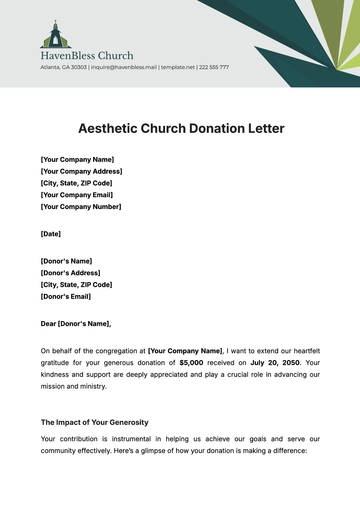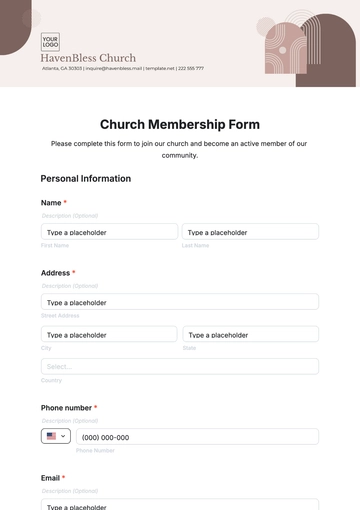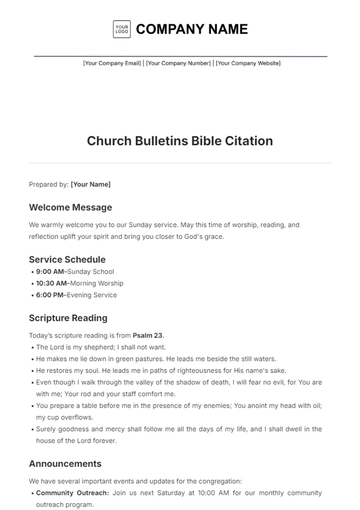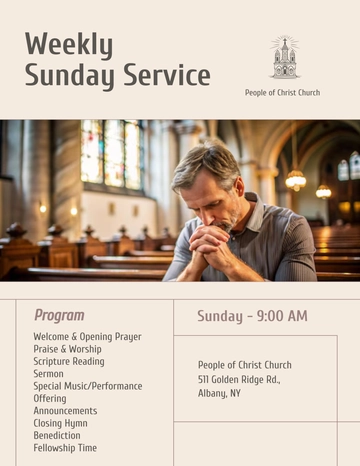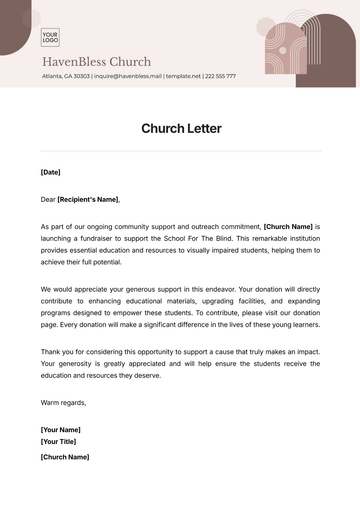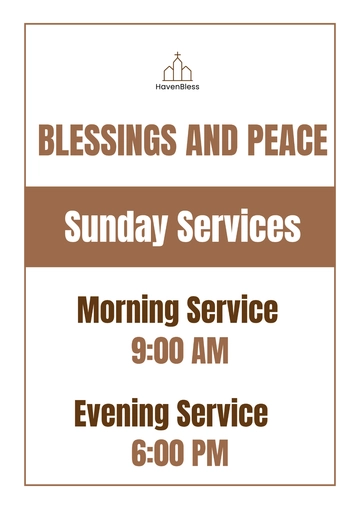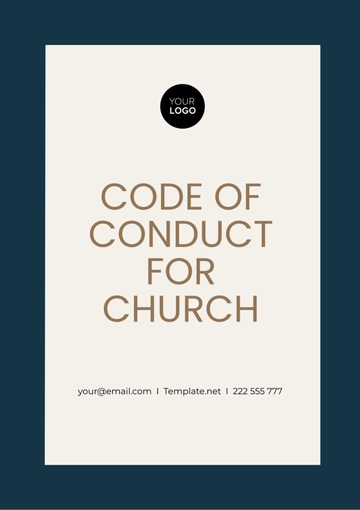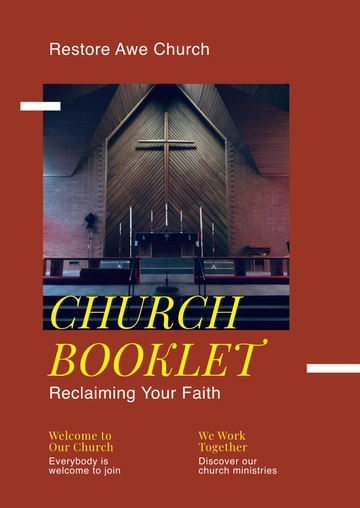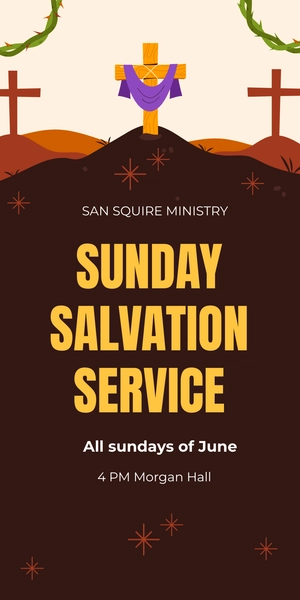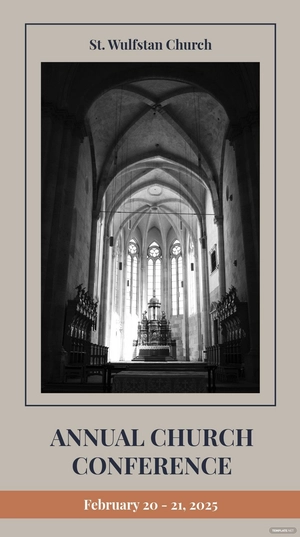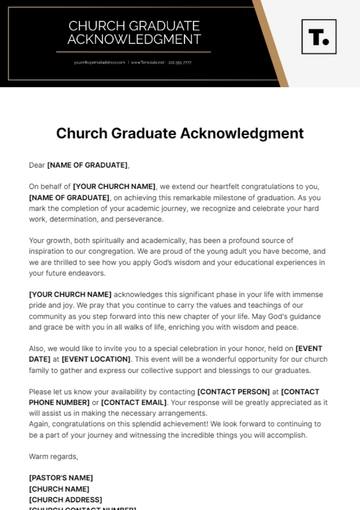Free Church Articles of Incorporation Bylaw Format
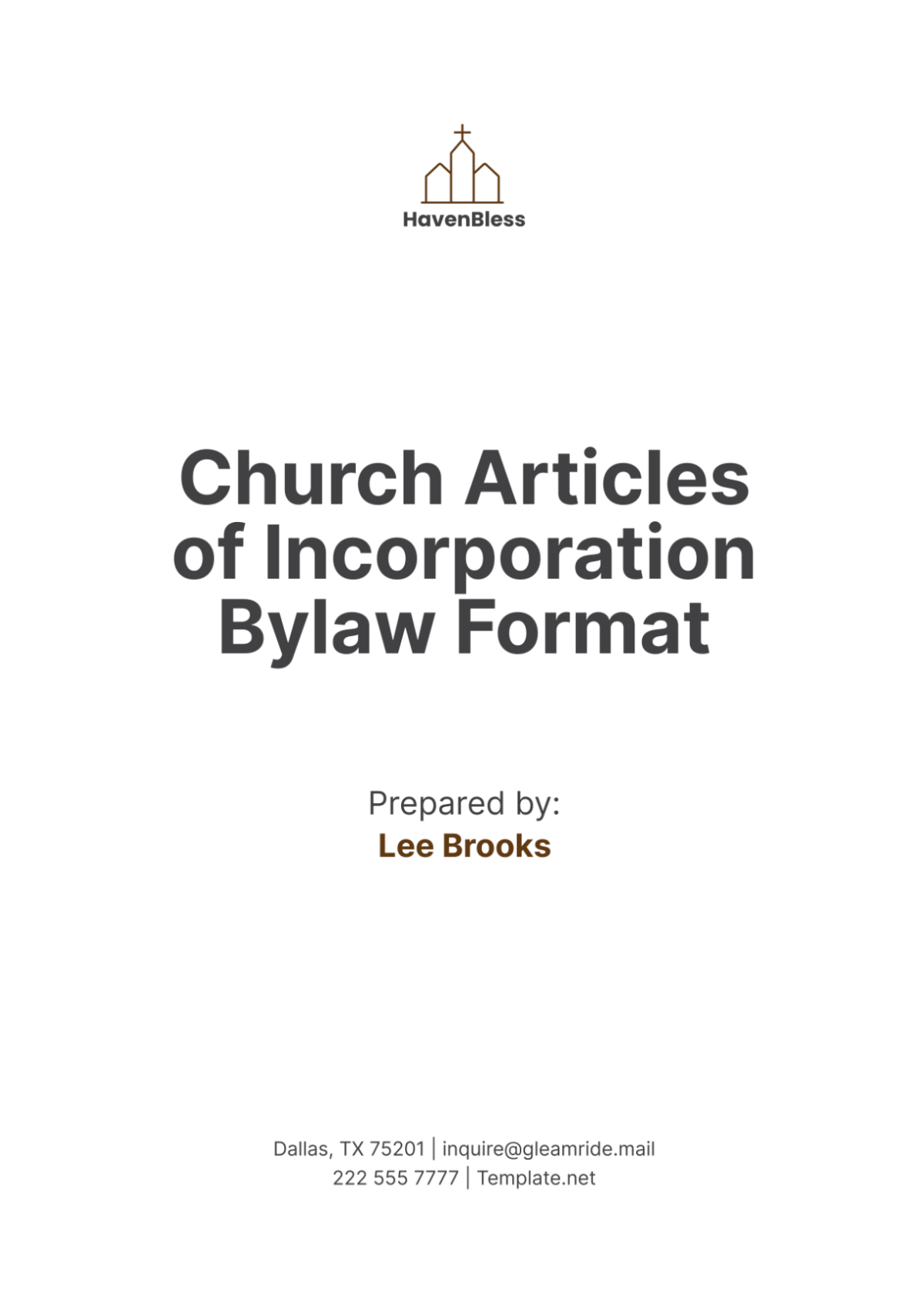
Article I. Introduction
A. Name of the Church
The official name of the church is [Your Company Name], hereinafter referred to as "the Church."
B. Principal Office Location
The principal office of the Church is located at [Your Company Address]. The Church may establish additional locations as necessary to fulfill its mission and purposes.
C. Purpose of the Bylaw
The purpose of this Bylaw is to set forth the rules and procedures for the operation, governance, and administration of the Church. This Bylaw serves as a guiding document to ensure the Church operates in an organized, transparent, and legally compliant manner.
D. Legal Authority and Compliance
This Bylaw is established in accordance with the laws of [State/Country], under which the Church is incorporated as a non-profit religious organization. The Church shall comply with all applicable federal, state, and local laws and regulations, maintaining its status as a tax-exempt entity under Section 501(c)(3) of the Internal Revenue Code.
Article II. Name and Purpose
A. Church Name
The name of the Church, as registered with the relevant authorities, is [Your Company Name]. This name shall be used in all legal, financial, and official matters.
B. Mission Statement
The mission of [Your Company Name] is to glorify God through worship, discipleship, evangelism, and service. The Church is dedicated to spreading the teachings of Jesus Christ, fostering spiritual growth, and meeting the needs of the community through various ministries and outreach programs.
C. Religious, Charitable, and Educational Purposes
The Church is organized exclusively for religious, charitable, and educational purposes, including but not limited to:
Conducting regular worship services and religious ceremonies.
Providing religious education and training through Sunday School, Bible studies, and other educational programs.
Engaging in charitable activities to support the needy, including food distribution, clothing drives, and financial assistance.
Promoting spiritual and moral development through pastoral care, counseling, and mentorship programs.
D. Duration of Incorporation
The duration of the Church's incorporation is perpetual. The Church shall continue to operate and fulfill its mission as long as it remains in compliance with its Articles of Incorporation, Bylaw, and applicable laws.
Article III. Membership
A. Definition of Membership
Membership in [Your Company Name] is open to all individuals who profess faith in Jesus Christ, have been baptized, and are committed to upholding the Church's mission and values. Members are expected to participate actively in the life of the Church, including attending services, engaging in ministries, and supporting the Church financially.
B. Eligibility for Membership
To be eligible for membership, an individual must:
Profess faith in Jesus Christ as their Lord and Savior.
Have been baptized by immersion or another recognized method.
Complete the Church's membership class or equivalent orientation program.
Agree to abide by the Church's Statement of Faith and Bylaw.
C. Admission Procedures
The admission process for new members includes the following steps:
Completion of a membership application form.
Participation in a membership class or orientation session.
An interview with the pastoral staff or designated membership committee.
Approval by the Board of Directors.
Public affirmation of membership during a worship service.
D. Rights and Responsibilities of Members
Members of [Your Company Name] have the following rights:
To vote on significant Church matters, including the election of Directors and major financial decisions.
To participate in all Church activities, ministries, and programs.
To receive pastoral care and support.
Members also have the following responsibilities:
To uphold and promote the Church's mission and values.
To attend worship services regularly and participate in Church activities.
To contribute financially to the Church's operations and ministries.
To serve in volunteer roles and ministries as able.
E. Termination of Membership
Membership may be terminated voluntarily or involuntarily:
Voluntary termination occurs when a member submits a written request to withdraw from membership.
Involuntary termination may occur for reasons such as failure to adhere to the Church's Bylaw, engaging in conduct detrimental to the Church, or prolonged inactivity. The Board of Directors, after due process and consideration, has the authority to terminate membership.
Article IV. Governance
A. Board of Directors
Composition and Number of Directors
The Board of Directors, hereinafter referred to as "the Board," shall consist of no fewer than five and no more than fifteen members. The exact number of Directors shall be determined by the Board and may be adjusted as necessary to meet the needs of the Church.
Qualifications
Directors must be members in good standing of [Your Company Name], demonstrate a commitment to the Church's mission and values, and possess qualities of spiritual maturity, leadership, and integrity.
Election and Term of Office
Directors shall be elected by the membership at the Annual Meeting. Each Director shall serve a term of three years, with the possibility of re-election for consecutive terms. Terms shall be staggered to ensure continuity on the Board.
Vacancies
In the event of a vacancy on the Board, the remaining Directors shall appoint a qualified member to fill the vacancy until the next Annual Meeting, at which time a permanent replacement shall be elected by the membership.
Duties and Responsibilities
The Board is responsible for the overall governance and administration of the Church, including:
Establishing policies and procedures to guide the Church's operations.
Overseeing the financial management of the Church, including budgeting, fundraising, and financial reporting.
Ensuring compliance with legal and regulatory requirements.
Supporting and evaluating the performance of the pastoral staff.
B. Officers
Positions and Roles
The officers of the Church shall include a President, Vice President, Secretary, and Treasurer. Additional officers may be appointed as deemed necessary by the Board.
Election and Term of Office
Officers shall be elected by the Board from among its members at the first Board meeting following the Annual Meeting. Officers shall serve a term of one year, with the possibility of re-election.
Duties and Responsibilities
President: The President shall preside over Board meetings, represent the Church in official matters, and ensure the implementation of Board decisions.
Vice President: The Vice President shall assist the President and assume the President's duties in their absence.
Secretary: The Secretary shall maintain accurate records of Board meetings, membership records, and official Church documents.
Treasurer: The Treasurer shall oversee the financial management of the Church, including budgeting, financial reporting, and compliance with financial policies.
C. Committees
Standing Committees
Standing committees shall be established to support the work of the Church in key areas, including but not limited to:
Finance Committee: Responsible for overseeing the Church's financial management.
Personnel Committee: Responsible for matters related to staff and volunteers.
Ministry Committee: Responsible for coordinating the Church's various ministries and programs.
Ad Hoc Committees
Ad hoc committees may be established by the Board as needed to address specific issues or projects. These committees shall have a defined purpose and duration.
Committee Roles and Responsibilities
Committees shall operate under the guidance of the Board, with clearly defined roles and responsibilities. Committees shall report regularly to the Board and seek Board approval for major decisions and initiatives.
Article V. Meetings
A. Annual Meetings
The Annual Meeting of the Church shall be held in [Month], at a time and place designated by the Board. The purpose of the Annual Meeting is to:
Elect Directors and officers.
Review and approve the annual budget.
Receive reports from the Board, officers, and committees.
Address other significant matters as determined by the Board.
B. Regular Meetings
Regular meetings of the Board shall be held monthly, at a time and place determined by the Board. These meetings are open to all members, except for executive sessions which are limited to Directors and invited participants.
C. Special Meetings
Special meetings of the Board or membership may be called by the President or upon the request of a majority of the Directors. Notice of special meetings shall be given at least seven days in advance, specifying the purpose, date, time, and location of the meeting.
D. Notice Requirements
Notice of all meetings shall be provided to members via email, the Church website, and announcements during worship services. Notices shall include the agenda, relevant documents, and any specific instructions for participation.
E. Quorum and Voting
A quorum for Board meetings shall consist of a majority of the Directors. A quorum for membership meetings shall consist of [percentage]% of the active members. Decisions shall be made by a majority vote of those present and voting, unless otherwise specified in the Bylaw.
F. Minutes and Records
The Secretary shall keep accurate minutes of all Board and membership meetings. Minutes shall be distributed to Directors and made available to members upon request. Official records of the Church, including minutes, financial reports, and legal documents, shall be maintained securely and made accessible as required by law.
Article VI. Financial Matters
A. Fiscal Year
The fiscal year of [Your Company Name] shall commence on January 1 and conclude on December 31 of each year. This period is designated for the purpose of financial reporting and budgeting.
B. Budget and Financial Planning
The Board of Directors is responsible for preparing and approving an annual budget that aligns with the Church's mission and strategic objectives. The budget shall outline projected income and expenditures for the fiscal year, providing a financial roadmap for the Church's operations. The Treasurer, in collaboration with the Finance Committee, shall present the proposed budget to the Board for review and approval no later than the November Board meeting. Once approved, the budget shall be presented to the membership at the Annual Meeting for final ratification.
C. Financial Records and Reporting
The Church shall maintain accurate and complete financial records in accordance with generally accepted accounting principles (GAAP). The Treasurer shall oversee the maintenance of these records, which shall include but are not limited to:
Income Statements: Detailing all sources of revenue, including tithes, offerings, donations, and fundraising activities.
Expense Reports: Documenting all expenditures, categorized by ministry and operational function.
Balance Sheets: Providing a snapshot of the Church's financial position, including assets, liabilities, and equity.
Monthly financial reports shall be prepared by the Treasurer and reviewed by the Board at each regular Board meeting. These reports shall also be made available to the membership upon request.
D. Banking and Investment Policies
The Church shall maintain its funds in financial institutions that are federally insured. The Board of Directors shall authorize the opening and closing of all bank accounts and designate signatories for these accounts. The Finance Committee shall develop and recommend investment policies to the Board, ensuring that investments are aligned with the Church's mission and provide for the prudent management of assets. Investments shall be reviewed periodically to assess performance and compliance with established policies.
E. Contracts and Legal Instruments
All contracts and legal instruments entered into by the Church must be authorized by the Board of Directors. The President, or another officer designated by the Board, shall have the authority to sign such documents on behalf of the Church. A record of all contracts and legal agreements shall be maintained by the Secretary and made available for review by the Board and membership as needed.
F. Audit and Review
To ensure financial accountability and transparency, the Church shall undergo an annual financial review conducted by an independent certified public accountant (CPA) or a qualified internal audit committee. The results of the audit or review shall be presented to the Board and summarized for the membership at the Annual Meeting. Any recommendations for improvements in financial practices or controls shall be implemented promptly.
Article VII. Amendments
A. Proposal of Amendments
Amendments to this Bylaw may be proposed by the Board of Directors or by a petition signed by at least ten percent (10%) of the Church's active membership. Proposed amendments must be submitted in writing to the Secretary and include the specific language of the amendment and a rationale for the change.
B. Notice and Review of Proposed Amendments
Upon receipt of a proposed amendment, the Secretary shall notify the Board and schedule a review at the next regular Board meeting. The proposed amendment shall be distributed to all members at least thirty (30) days prior to the meeting at which it will be considered. Members shall have the opportunity to review and discuss the proposed amendment during this period.
C. Adoption of Amendments
Amendments to the Bylaw require approval by a two-thirds (2/3) majority vote of the members present at a duly called membership meeting. The Board shall facilitate a thorough discussion of the proposed amendment before the vote. Once adopted, the amendment shall take effect immediately unless otherwise specified in the amendment itself.
D. Record of Amendments
The Secretary shall maintain a record of all amendments to the Bylaw, including the date of adoption and the text of the amendment. This record shall be incorporated into the official copy of the Bylaw and made available to all members upon request.
Article VIII. Indemnification
A. Indemnification of Directors, Officers, and Employees
[Your Company Name] shall indemnify its Directors, officers, and employees to the fullest extent permitted by law against expenses, including attorney's fees, judgments, fines, and amounts paid in settlement, incurred by such individuals in connection with any action, suit, or proceeding arising out of their service to the Church, provided that the individual acted in good faith and in a manner they reasonably believed to be in the best interests of the Church.
B. Insurance
The Church shall purchase and maintain insurance on behalf of its Directors, officers, and employees against any liability asserted against them in their official capacities. This insurance coverage shall be reviewed and approved by the Board annually to ensure it meets the Church's needs and complies with legal requirements.
C. Limitations on Indemnification
Indemnification shall not be provided for any individual if the Board determines that the individual engaged in willful misconduct, fraud, or a knowing violation of the law. In such cases, the Church shall seek restitution for any damages incurred as a result of the individual's actions.
Article IX. Dissolution
A. Procedure for Dissolution
The dissolution of [Your Company Name] shall be conducted in accordance with the laws of [State/Country]. A resolution to dissolve the Church must be approved by a two-thirds (2/3) majority vote of the Board of Directors and subsequently ratified by a two-thirds (2/3) majority vote of the members present at a duly called membership meeting.
B. Distribution of Assets
Upon dissolution, the assets of the Church shall be distributed for one or more exempt purposes within the meaning of Section 501(c)(3) of the Internal Revenue Code. The Board shall oversee the distribution process, ensuring that assets are transferred to organizations that share the Church's religious, charitable, and educational objectives. No part of the assets shall inure to the benefit of any private individual or member.
C. Compliance with State and Federal Laws
The dissolution process shall be conducted in compliance with all applicable state and federal laws. The Board shall ensure that all necessary filings and notifications are completed, including the filing of a final tax return and the cancellation of the Church's tax-exempt status with the Internal Revenue Service.
Article X. Miscellaneous Provisions
A. Non-Discrimination Policy
[Your Company Name] is committed to creating an inclusive and welcoming environment for all individuals. The Church shall not discriminate on the basis of race, color, national origin, sex, age, disability, or any other characteristic protected by law in its programs, activities, and employment practices.
B. Conflict of Interest Policy
The Church shall adopt and implement a Conflict of Interest Policy to ensure that all decisions and actions are made in the best interests of the Church. Directors, officers, and employees must disclose any potential conflicts of interest and refrain from participating in discussions or decisions where such conflicts exist. The Board shall review and address any conflicts of interest in accordance with the policy.
C. Severability Clause
If any provision of this Bylaw is found to be invalid or unenforceable, the remaining provisions shall continue in full force and effect. The invalidity of any provision shall not affect the validity of the remaining provisions, which shall be interpreted and enforced to best achieve the intent of the Bylaw.
D. Governing Law
This Bylaw shall be governed by and construed in accordance with the laws of [State/Country]. Any disputes arising under this Bylaw shall be resolved in accordance with the governing laws, and the venue for such disputes shall be [designated court or jurisdiction].
- 100% Customizable, free editor
- Access 1 Million+ Templates, photo’s & graphics
- Download or share as a template
- Click and replace photos, graphics, text, backgrounds
- Resize, crop, AI write & more
- Access advanced editor
Formalize your church's establishment with Template.net's customizable and editable Church Articles of Incorporation Bylaw Format Template. The Ai Editor Tool allows you to personalize it to meet legal requirements and church-specific needs, ensuring a strong foundation for your organization.
